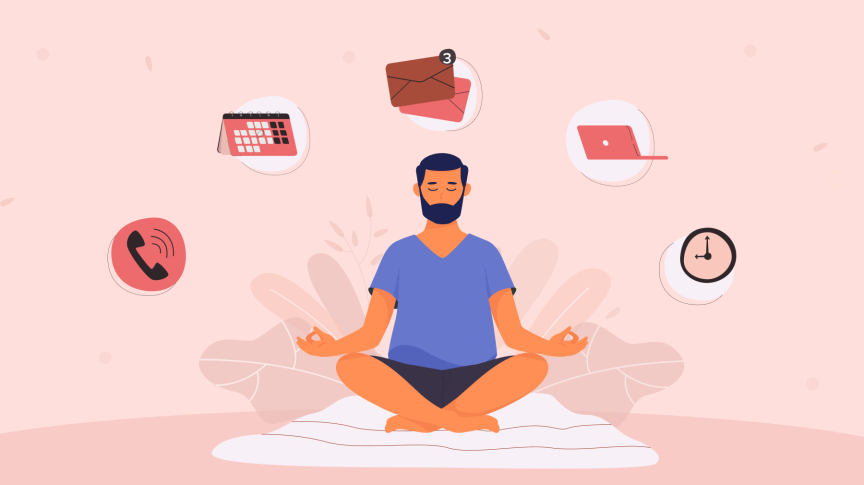Today, work and personal lives are extremely busy, and stress has become a regular part of everyday life. When employees are working hard to achieve goals, perform demanding tasks, and balance their personal and professional responsibilities, it can take a toll on their mental health. However, addressing mental health issues in the workplace is crucial to everyone’s well-being and the success of your business. By understanding the importance of managing stress and implementing effective methods, you can create a better and more productive workplace. Here are some important steps you can take to manage stress in the workplace and improve your mental health.
How to Know if Someone is Stressed Out
To deal with anxiety, you first need to recognize the signs. Stress can manifest itself in a variety of ways, both physically and mentally. Headaches, fatigue, muscle tension, stomach upset, and sleep problems are all common signs of stress. Many people also experience emotional issues, such as worry, mood swings, and feeling overwhelmed. Stress can also affect brain function, making you have trouble concentrating, become forgetful, and be prone to negative thoughts. Behavioral changes, such as procrastination or withdrawing from coworkers, can also be an indication that worrying is taking its toll on your mental health.
Creating a Supportive Workplace
To manage anxiety at work, you need a supportive environment. Employees need to know that they are respected and understood, and that they should feel free to ask for help when they need it. By fostering open dialogue and providing psychological support, you can reduce stress in the workplace. Regular communication with managers is a good way to discuss employees’ work, progress, and any concerns. Clear communication prevents employees from feeling alone or confused. In addition, it is important to promote work-life balance. Telling your employees to take breaks, take vacation days, and not work overtime can help reduce stress. A fair work environment gives people the opportunity to rest and recover, which prevents them from burning out. Flexibility, such as allowing employees to work from home or adjust their hours, can also reduce stress by giving employees more autonomy.
Time Management Tips
Good time management is essential for dealing with stress in the workplace. Poor time management can lead to missing deadlines, procrastination, and increased stress. Prioritizing your work can help you manage your time better. The Eisenhower Matrix helps people rank tasks based on their importance and how quickly they need to be completed. This helps them prioritize the most important tasks. It also makes it easier to break work down into smaller, more doable pieces. Setting achievable daily goals can help employees stay on track without feeling overwhelmed. Delegating work to others, when appropriate, can reduce the amount of work that needs to be done. Sharing tasks helps people work better together and reduces their own stress.
Mindfulness and relaxation techniques should be used.
Mindfulness and relaxation techniques can help you reduce stress. These activities help you clear your mind, reduce stress, and improve your mental health. A simple and effective way to deal with anxiety is to practice deep breathing. Taking a few minutes to breathe calmly and deeply each day can help you focus and reduce stress. Meditation is also a good option. Taking a few moments each day to calmly think and focus on your breathing can help you relax and think more clearly. Meditation, even for a short period of time, can help employees reset and feel more focused. Giving employees the chance to take a break from work and focus on the present can also help reduce stress. Mindfulness breaks, such as walking around the office, stretching, or simply observing what’s going on around you, can help you clear your mind and relax.
Exercise regularly
One of the best ways to deal with anxiety and improve your mental health is to exercise. Endorphins are natural chemicals that improve your mood and make you feel better after exercise. Regular exercise can help you sleep better, have more energy, and boost your self-esteem. Human
Feel less anxious. Talking to coworkers or friends during breaks can give you social support and a sense of connection, which can help you cope with stress. Another way to relax is to take up a hobby after work. Hobbies like reading, cooking, and art are also good choices as a healthy way to relax and unwind.
Seek professional help.
If you have any concerns, seek professional help immediately. Many workplaces have programs called Employee Assistance Programs (EAPs). These programs offer employees counseling and other support services in a private setting. Talking to a therapist or counselor can help people find ways to manage stress, address underlying mental health issues, and improve their overall well-being. Professional help can help you learn how to deal with worries and mental health issues in a healthy way. You will be given advice and helpful resources.
Take regular breaks.
It is important to take breaks throughout the day to keep your mind healthy. If you work long hours without taking breaks, chances are you’ll feel tired, exhausted, and less productive. It’s best for employees to take breaks, walk away from their desks, and not think about work. The Pomodoro Technique is a method that encourages focused work followed by short breaks. Stretching, taking a walk, or just relaxing for a few minutes can help you feel more energized and clearer. Employees can recharge during their breaks, which helps them stay focused and get more done throughout the day.
Summary
Employee mental health is an important part of their overall health. Employers can make the workplace healthier and more productive by paying attention to stress signals, using effective stress management methods, and making the workplace a pleasant place to work. By promoting open communication, providing support, and making work-life balance a high priority, employees can better manage stress and maintain good mental health. Mindfulness, exercise, good time management, and healthy ways to cope with stress are all effective ways to deal with stress in the workplace. Discussing mental health issues up front can make the workplace more pleasant and helpful for everyone.




